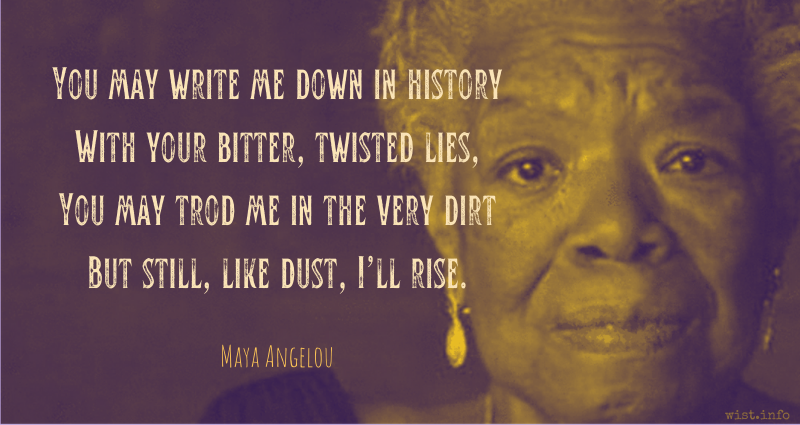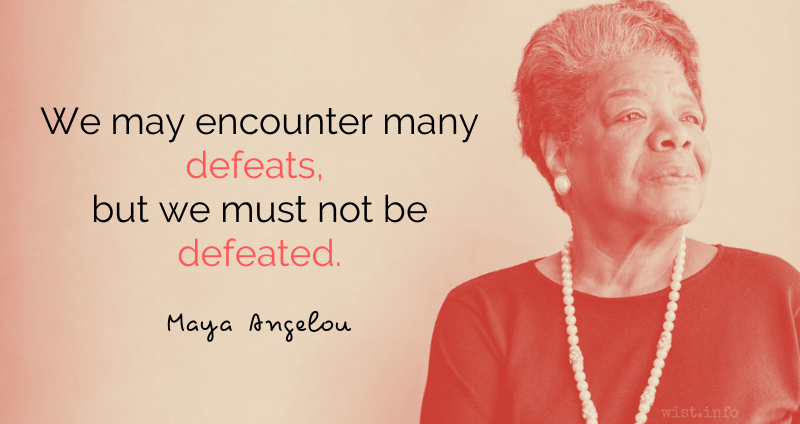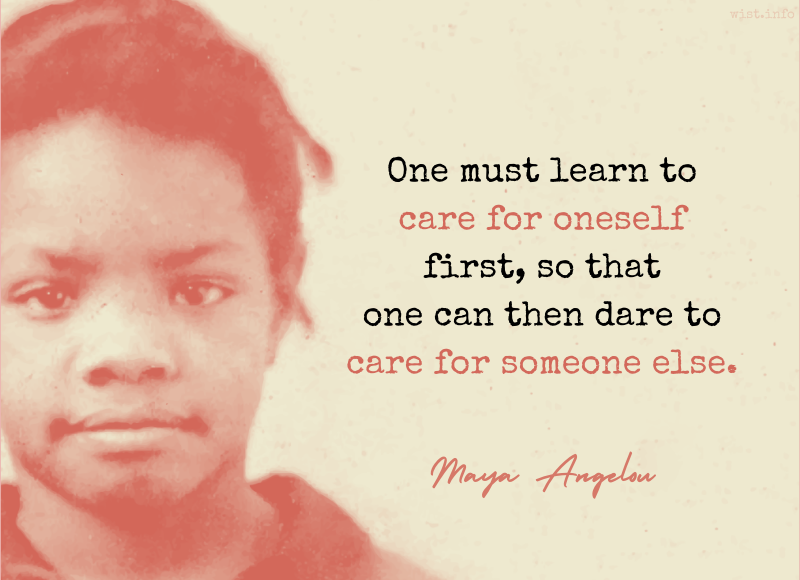Throughout our nervous history, we have constructed pyramidic towers of evil, ofttimes in the name of good. Our greed, fear and lasciviousness have enabled us to murder our poets, who are ourselves, to castigate our priests, who are ourselves. The lists of our subversions of the good stretch from before recorded history to this moment. We drop our eyes at the mention of the bloody, torturous Inquisition. Our shoulders sag at the thoughts of African slaves lying spoon-fashion in the filthy hatches of slave-ships, and the subsequent auction blocks upon which were built great fortunes in our country. We turn our heads in bitter shame at the remembrance of Dachau and the other gas ovens, where millions of ourselves were murdered by millions of ourselves. As soon as we are reminded of our actions, more often than not we spend incredible energy trying to forget what we’ve just been reminded of.
Maya Angelou (1928-2014) American poet, memoirist, activist [b. Marguerite Ann Johnson]
“Facing Evil,” Interview by Bill Moyers (1982)
(Source)
Quotations by:
Angelou, Maya
I love to see a young girl go out and grab the world by the lapels. Life’s a bitch. You’ve got to go out and kick ass.
One of the first things that a young person must internalize, deep down in the blood and bones, is the understanding that he may encounter many defeats, but he must not be defeated. If life teaches us anything, it may be that it’s even necessary to suffer some defeats. When we look at a diamond, a diamond is the result of extreme pressure. Less pressure, it is crystal; less than that, it is coal; and less than that, it is fossilized leaves or just plain dirt. It is necessary, therefore, to be tough enough to bite the bullet as it is in fact shot into one’s mouth, to bite it and stop it before it tears a hole in one’s throat.
Maya Angelou (1928-2014) American poet, memoirist, activist [b. Marguerite Ann Johnson]
“Maya Angelou Raps,” interview by Jeffrey M. Elliot, Sepia (Oct 1977)
(Source)
Every human being has paid the earth to grow up. Most people don’t grow up. It’s too damn difficult. What happens is most people get older. That’s the truth of it. They honor their credit cards, they find parking spaces, they marry, they have the nerve to have children, but they don’t grow up. Not really. They grow older. But to grow up costs the earth, the earth. It means you take responsibility for the time you take up, for the space you occupy. It’s serious business. And you find out what it costs us to love and to lose, to dare and to fail. And maybe even more, to succeed. What it costs, in truth.
Maya Angelou (1928-2014) American poet, memoirist, activist [b. Marguerite Ann Johnson]
“Maya Angelou, The Art of Fiction No. 119,” Interview with George Plimpton, The Paris Review (Fall 1990)
(Source)
Angelou used the core section (credit cards, parking spaces) a number of times in different interviews.
You may write me down in history
With your bitter, twisted lies,
You may trod me in the very dirt
But still, like dust, I’ll rise.Maya Angelou (1928-2014) American poet, memoirist, activist [b. Marguerite Ann Johnson]
“Still I Rise,” And Still I Rise (1978)
(Source)
Never let the facts alone obscure the truth of your narrative. The truth is what your life really felt like.
Maya Angelou (1928-2014) American poet, memoirist, activist [b. Marguerite Ann Johnson]
“The Art of Fiction,” Paris Review, #116, Interview with George Plimpton (1990)
(Source)
I really love language; it allows us to explain the pain and the glory, the nuances and the delicacies, of our existence. Most of all, it allows us to laugh. We need language.
I look at some of the great novelists, and I think the reason they are great is that they’re telling the truth. The fact is they’re using made-up names, made-up people, made-up places, and made-up times, but they’’re telling the truth about the human being — what we are capable of, what makes us lose, laugh, weep, fall down, and gnash our teeth and wring our hands and kill each other and love each other.
Maya Angelou (1928-2014) American poet, memoirist, activist [b. Marguerite Ann Johnson]
“The Art of Fiction,” Paris Review, #116, Interview with George Plimpton (1990)
(Source)
I’m working at trying to be a good Christian, and that’s serious business. It’s like trying to be a good Jew, a good Muslim, a good Buddhist, a good Shintoist, a good Zoroastrian, a good friend, a good lover, a good mother, a good buddy — it’s serious business. It’s not something where you think, Oh, I’ve got it done. I did it all day, hotdiggety. The truth is, all day long you try to do it, try to be it, and then in the evening if you’re honest and have a little courage you look at yourself and say, Hmm. I only blew it eighty-six times. Not bad.
Maya Angelou (1928-2014) American poet, memoirist, activist [b. Marguerite Ann Johnson]
“The Art of Fiction,” Paris Review, #116, Interview with George Plimpton (1990)
(Source)
I’ve learned to write in the first-person singular while remembering always that my writing must speak to the first-person plural.
Maya Angelou (1928-2014) American poet, memoirist, activist [b. Marguerite Ann Johnson]
“The Art of Fiction,” Paris Review, #116, Interview with George Plimpton (1990)
(Source)
There is, I hope, a thesis in my work: we may encounter many defeats, but we must not be defeated.
Maya Angelou (1928-2014) American poet, memoirist, activist [b. Marguerite Ann Johnson]
“The Art of Fiction,” Paris Review, #116, Interview with George Plimpton (1990)
(Source)
Human beings are more alike than unalike. There’s no real mystique. Every human being, every Jew, Christian, back-slider, Muslim, Shintoist, Zen Buddhist, atheist, agnostic, every human being wants a nice place to live, a good place for the children to go to school, healthy children, somebody to love, the courage, the unmitigated gall, to accept love in return, some place to relax on Saturday or Sunday night, and some place to experience their God.
Maya Angelou (1928-2014) American poet, memoirist, activist [b. Marguerite Ann Johnson]
“The Art of Fiction,” Paris Review, #116, Interview with George Plimpton (1990)
(Source)
A similar passage, from a speech at Ohio Dominican College (9 Dec 1993): "Humans are wonderfully different and marvelously alike. Human being are more alike than unalike. Whether in Paris, Texas, or Paris, France, we all want to have good jobs where we are needed and respected and paid just a little more than we deserve. We want healthy children, safe streets, to be loved and have the unmitigated gall to accept love. If we are religious, we want a place to perpetuate God. If not, we want a good lecture every once in a while. And everyone wants someplace to party on Saturday nights."
You can never leave home. You take it with you no matter where you go. Home is between your teeth, under your fingernails, in the hair follicles, in your smile, in the ride of your hips, in the passage of your breasts.
Maya Angelou (1928-2014) American poet, memoirist, activist [b. Marguerite Ann Johnson]
“The Art of Fiction,” Paris Review, #116, Interview with George Plimpton (1990)
(Source)
Home is in every sentence of your writing.
Maya Angelou (1928-2014) American poet, memoirist, activist [b. Marguerite Ann Johnson]
“The Art of Fiction,” Paris Review, #116, Interview with George Plimpton (1990)
(Source)
Nature has no mercy at all. Nature says, “I’m going to snow. If you have on a bikini and no snowshoes, that’s tough. I am going to snow anyway.”
I believe we are still so innocent. The species are still so innocent that a person who is apt to be murdered believes that the murderer, just before he puts the final wrench on his throat, will have enough compassion to give him one sweet cup of water.
Strictly speaking, one cannot legislate love, but what one can do is legislate fairness and justice. If legislation does not prohibit our living side by side, sooner or later your child will fall on the pavement and I’ll be the one to pick her up. Or one of my children will not be able to get into the house and you’ll have to say, “Stop here until your mom comes here.” Legislation affords us the chance to see if we might love each other.
Self-pity in its early stage is as snug as a feather mattress. Only when it hardens does it become uncomfortable.
Maya Angelou (1928-2014) American poet, memoirist, activist [b. Marguerite Ann Johnson]
Gather Together in My Name, ch. 6 (2009)
Full text.
Children’s talent to endure stems from their ignorance of alternatives.
Maya Angelou (1928-2014) American poet, memoirist, activist [b. Marguerite Ann Johnson]
I Know Why the Caged Bird Sings, ch. 17 (1969)
(Source)
Oh, the holiness of always being the injured party. The historically oppressed can find not only sanctity but safety in the state of victimization. When access to a better life has been denied often enough, and successfully enough, one can use the rejection as an excuse to cease all efforts. After all, one reckons, “they” don’t want me, “they” accept their own mediocrity and refuse my best, “they” don’t deserve me.
If I wanted to write, I had to be willing to develop a kind of concentration found mostly in people awaiting execution.
Perhaps travel cannot prevent bigotry, but by demonstrating that all peoples cry, laugh, eat, worry, and die, it can introduce the idea that if we try and understand each other, we may even become friends.
Maya Angelou (1928-2014) American poet, memoirist, activist [b. Marguerite Ann Johnson]
Wouldn’t Take Nothing for My Journey Now, ch. 2 “Passports to Understanding” (1993)
(Source)
One must learn to care for oneself first, so that one can then dare to care for someone else. That’s what it takes to make the caged bird sing.
Maya Angelou (1928-2014) American poet, memoirist, activist [b. Marguerite Ann Johnson]
In Jeffrey M. Elliot, “Maya Angelou Raps,” Sepia (Oct 1977)
(Source)
Bitterness is like cancer. It eats upon the host. But anger is like fire. It burns all clean.
Maya Angelou (1928-2014) American poet, memoirist, activist [b. Marguerite Ann Johnson]
In Mary Chamberlain, ed., Writing Lives: Conversations Between Women Writers (1988)
(Source)




